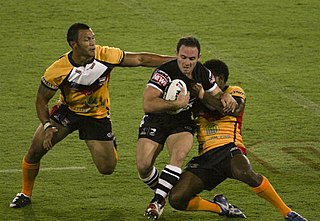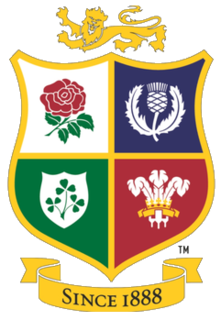
The British & Irish Lions is a rugby union team selected from players eligible for any of the Home Nations – the national teams of England, Scotland, Wales and Ireland. The Lions are a Test side, and generally select international players, but they can pick uncapped players available to any one of the four unions. The team currently tours every four years, with these rotating among Australia, New Zealand, and South Africa. The 2009 Test series was lost 1–2 to South Africa, while the 2013 Test series was won 2–1 over Australia. The most recent series, the 2017 series against New Zealand, was drawn 1-1.

The Australia national rugby union team, nicknamed the Wallabies, is controlled by Rugby Australia. The team first played at Sydney in 1899, winning their first test match against the touring British Isles team.

Cyril Towers was an Australian rugby union player, a state and national representative centre who made 57 appearances for the Wallabies, played in 19 Test matches and captained the national side on three occasions in 1937.

The Fiji national rugby union team competes every four years at the Rugby World Cup, and their best performances were the 1987 and 2007 tournaments when they defeated Argentina and Wales respectively to reach the quarterfinals. Fiji also regularly plays test matches during the June and November test windows. Fiji also plays in the Pacific Tri-Nations, and has won the most Pacific Tri-Nations Championships of the three participating teams.
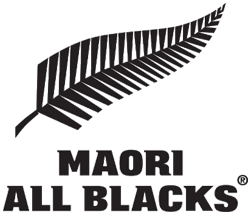
The Māori All Blacks, previously called the New Zealand Māori, are a rugby union team from New Zealand. A representative team of the New Zealand Rugby Union, a prerequisite for playing in the team is that the player has Māori whakapapa (genealogy). In the past this rule was not strictly applied; non–Māori players who looked Māori were often selected in the team. These included a few Pacific island players and a couple of African descent. Today all players have their ancestry verified before selection in the team.

The 1908 British Isles tour to New Zealand and Australia was the seventh tour by a British Isles team and the fourth to New Zealand and Australia. The tour is often referred to as the Anglo-Welsh Tour as only English and Welsh players were selected due to the Irish and Scottish Rugby Unions not participating. It is retrospectively classed as one of the British Lions tours, as the Lions naming convention was not adopted until 1950.
The New Zealand national rugby union team has played 34 matches against Wales, winning 31 of them. The first Test match between the two sides was played in 1905 at Cardiff Arms Park, with Wales winning 3–0 when the All Blacks were in Wales as part of their European and North America tour. The loss was said to be controversial wing Bob Deans claimed to have scored a try that would have brought them level. However, Wales were generally considered the better team with the All Blacks playing particularly poorly in the first half of the game. Two more Welsh victories in the next 50 years were balanced by a defeat by the 1924 All Black "Invincibles". Since the last loss New Zealand have won 25 encounters and Wales winning 0. Wales also played the touring New Zealand Natives team at St Helens on 22 December 1888 defeating them by 1 Goal to nil and the New Zealand Services at Cardiff on 21 April 1919, with Wales losing 6–3. Wales has accorded both of these matches 'test' status but neither game is considered to be an official test by New Zealand. Wales has also played the New Zealand Maori in Cardiff on 13 November 1982 defeating them 25–19. Neither country accorded that game test status.
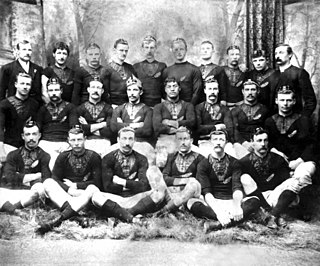
The 1893 New Zealand tour rugby to Australia was the second tour by the New Zealand national rugby union team to Australia. Ten matches were played against regional and district sides, but no Test matches were played. It was first tour arranged by New Zealand Rugby Football Union which was founded the year before. The only previous New Zealand national team was the side that toured New South Wales in 1884. Immediately before departing for Sydney, the tourists played a match against a "Combined XV" in Wellington, which New Zealand won 7–4.

The 1907–1908 New Zealand rugby tour of Australia and Great Britain was made by a group of New Zealand rugby footballers who played matches in Australia, Ceylon, England and Wales between 1907 and 1908. Most of the matches were played under the rules of the Northern Union, a sport that is today known as rugby league. As such, the team were the immediate predecessors of the New Zealand national rugby league team. The tour had a large role in establishing rugby league in both Australia and New Zealand, and also gave birth to international rugby league. The tour party has come to be known as the professional All Blacks or All Golds, although at the time they were commonly referred to as the All Blacks—a named popularised by the New Zealand rugby union team that toured the Northern Hemisphere in 1905.
William Beverley James "Billy" Sheehan was an Australian rugby union player, a state and national representative fly-half in the 1920s. Eighteen of his New South Wales state appearances have since been decreed as Test matches by the Australian Rugby Union and Sheehan, who led the side in three such matches in 1923, was therefore a captain of the Australian national team.
Edward Joseph "Ted" Thorn was an Australian rugby union player, a state and national representative flanker who made 36 appearances for the Waratahs. He played in fifteen Test matches and was captaining the national side on thirteen occasions between 1924 and 1926.

The 1921 South Africa rugby union tour of Australia and New Zealand was the third tour made by the Springboks rugby team, and their first tour to Australia and New Zealand. South Africa played three Test matches against the All Blacks. The series was drawn 1–all, and the long-running controversy between the countries over the All Blacks' inclusion of Maori players began.
The 1920 New Zealand tour rugby to New South Wales was the ninth tour by the New Zealand national team to Australia. The three most important matches on the tour were played against the New South Wales selection, and the All Blacks won the 3 match series 3–0.
The 1924 New Zealand tour rugby to New South Wales was the 11th tour by the New Zealand national rugby union team to Australia.
The 1925 New Zealand tour rugby to New South Wales was the 12th tour by the New Zealand national team to Australia.
Robert Briton Loudon was a New Zealand born rugby union player, a flanker who made twenty-three representative appearances for the New South Wales state team in the 1920s. Seven of these matches have since been decreed as Test matches by the Australian Rugby Union and Loudon, who led the side in one such match in 1928, was therefore a captain of the Australian national team. After rugby union restarted in Queensland in 1929, and national selections were made from the two states Loudon played in six further full Australian Wallaby Test sides. In addition to his thirteen Test matches he made a further twenty-one tour match appearances for representative Australian sides on three international tours between 1923 and 1933.
The 1926 New Zealand tour rugby to New South Wales was the 13th tour by the New Zealand national rugby union team to Australia.
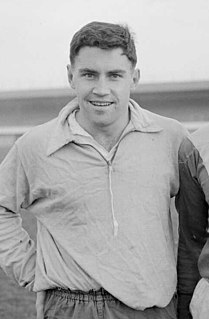
Peter George Johnson was an Australian international rugby union player. He enjoyed a long state and international career throughout the 1960s and made 92 national appearances for his country. He captained the Australian side in five Test matches.
Geoffrey Arnold Shaw is an Australian former national representative rugby union player who played for and captained the Wallabies. He made state representative appearances for both New South Wales and Queensland over an eleven-year period from 1969.


